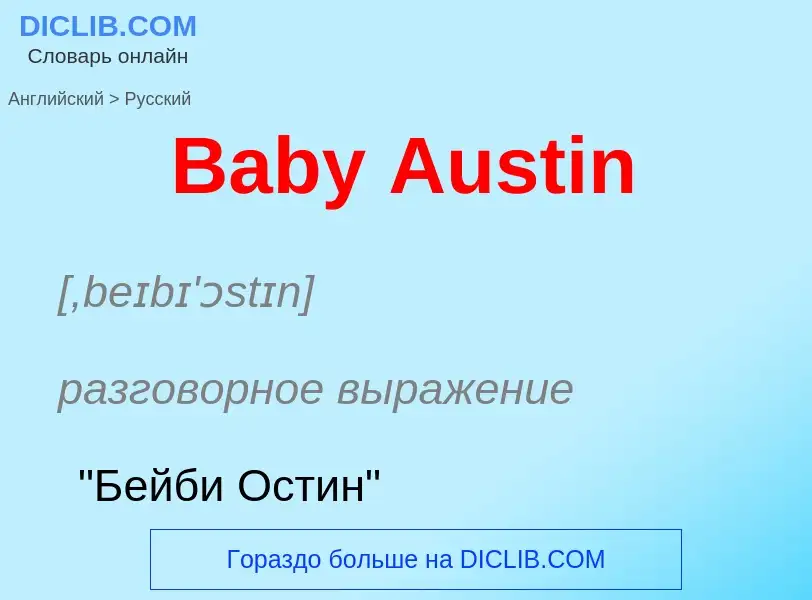Translation and analysis of words by ChatGPT artificial intelligence
On this page you can get a detailed analysis of a word or phrase, produced by the best artificial intelligence technology to date:
- how the word is used
- frequency of use
- it is used more often in oral or written speech
- word translation options
- usage examples (several phrases with translation)
- etymology
Baby Austin - translation to English
[,beɪbɪ'ɔstɪn]
разговорное выражение
"Бейби Остин"
синоним
['ɔstɪn]
общая лексика
"Остин" (марка легкового автомобиля компании "Роувер груп" [Rover Group])
существительное
общая лексика
Остин (мужское имя)
география
г. Остин
синоним
Definition
Wikipedia
The Austin 7 is an economy car that was produced from 1923 until 1939 in the United Kingdom by Austin. It was nicknamed the "Baby Austin" and was at that time one of the most popular cars produced for the British market and sold well abroad. Its effect on the British market was similar to that of the Model T Ford in the US, replacing most other British economy cars and cyclecars of the early 1920s. It was also licensed and copied by companies all over the world. The first BMW car, the BMW Dixi, was a licensed Austin 7. In France they were made and sold as Rosengarts, and in the United States they were built by the American Austin Car Company. In Japan, Nissan also used the 7 design as the basis for their first cars, although not under licence. This eventually led to a 1952 agreement for Nissan to build and sell Austins (which were now being made under the British Motor Corporation) in Japan under the Austin name.
Many Austin 7s were rebuilt as "specials" after the Second World War, including the first race car built by Bruce McLaren, and the first Lotus, the Mark I. Companies such as Speedex in Luton thrived in the late 1950s by producing race-proven bodies and engine parts for the Seven chassis.
Such was the power of the Austin 7 name that the company re-used it for early versions of the A30 in 1951 and Mini in 1959.







![Arthur Waite won the [[1928 100 Miles Road Race]] (later known as the 1928 Australian Grand Prix) driving an Austin 7. Arthur Waite won the [[1928 100 Miles Road Race]] (later known as the 1928 Australian Grand Prix) driving an Austin 7.](https://commons.wikimedia.org/wiki/Special:FilePath/Austin 7 of Arthur Waite.jpg?width=200)







![Remains of [[Dalai Lama]]'s Austin 7. [[Lhasa]], 1993 Remains of [[Dalai Lama]]'s Austin 7. [[Lhasa]], 1993](https://commons.wikimedia.org/wiki/Special:FilePath/Dalai Lama's Baby Austin car.jpg?width=200)
.jpg?width=200)




.jpg?width=200)
![Colorado River]]. Colorado River]].](https://commons.wikimedia.org/wiki/Special:FilePath/2011 Texas Drought.jpg?width=200)
![moonlight towers]] in Austin moonlight towers]] in Austin](https://commons.wikimedia.org/wiki/Special:FilePath/9162018.Moon.Light.towers.NRSID76002071 02.jpg?width=200)
![2009 [[Austin City Limits Music Festival]] with view of stages and Downtown Austin 2009 [[Austin City Limits Music Festival]] with view of stages and Downtown Austin](https://commons.wikimedia.org/wiki/Special:FilePath/ACL2009SBH.jpg?width=200)
![Austin covered in snow on February 15, 2021. Photo from [[ESA]]. Austin covered in snow on February 15, 2021. Photo from [[ESA]].](https://commons.wikimedia.org/wiki/Special:FilePath/Austin, Texas covered in snow ESA23166430.jpeg?width=200)
![Austin Community College]] Austin Community College]]](https://commons.wikimedia.org/wiki/Special:FilePath/Austin Community College campus in 2013.jpg?width=200)
![Downtown Station]] Downtown Station]]](https://commons.wikimedia.org/wiki/Special:FilePath/Austin Metrorail.jpg?width=200)




![Ann and Roy Butler Hike-and-Bike Trail along [[Lady Bird Lake]] Ann and Roy Butler Hike-and-Bike Trail along [[Lady Bird Lake]]](https://commons.wikimedia.org/wiki/Special:FilePath/ButlerTrailAustin.jpg?width=200)
![H-E-B Center]] stadium located in [[Cedar Park, Texas]] H-E-B Center]] stadium located in [[Cedar Park, Texas]]](https://commons.wikimedia.org/wiki/Special:FilePath/Cedar park center 2014.jpg?width=200)


![Austin's [[Deep Eddy Pool]] is the oldest human-made pool in Texas. Austin's [[Deep Eddy Pool]] is the oldest human-made pool in Texas.](https://commons.wikimedia.org/wiki/Special:FilePath/DeepEddyPoolBySteveHopson.jpg?width=200)
![The [[Lyndon Baines Johnson Presidential Library]] on the [[University of Texas]] campus in Austin The [[Lyndon Baines Johnson Presidential Library]] on the [[University of Texas]] campus in Austin](https://commons.wikimedia.org/wiki/Special:FilePath/LBJ Library 2017.jpg?width=200)


![Loop 360]] in the [[Texas Hill Country]]. Loop 360]] in the [[Texas Hill Country]].](https://commons.wikimedia.org/wiki/Special:FilePath/Pennybacker bridge sunset 2006.jpg?width=200)

.png?width=200)
![Sixth Street]] on a weekend night Sixth Street]] on a weekend night](https://commons.wikimedia.org/wiki/Special:FilePath/Sixth Street (Austin) at night.jpg?width=200)


![State Highway 45]] State Highway 45]]](https://commons.wikimedia.org/wiki/Special:FilePath/Texas45.jpg?width=200)

![The University of Texas at Austin]] The University of Texas at Austin]]](https://commons.wikimedia.org/wiki/Special:FilePath/Texas University at Austin (8095546843).jpg?width=200)

